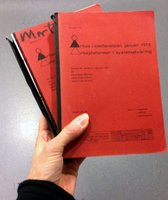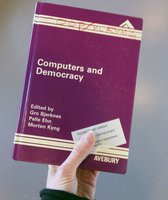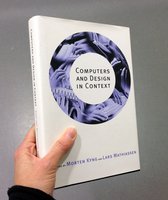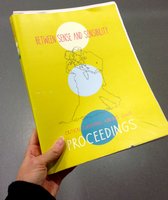The fifth decennial Aarhus conference, Critical Alternatives, focuses on alternatives related to information technologies from a quality of life perspective.
The, primarily Nordic, conference held in 1975 was a milestone in defining the development of computer-based, socio-technical systems as an area where the end-users should have a major say. At the conference in 1985 a lot of concrete experience on how to practically work together with workers were presented along with more theoretical or conceptual contributions on, e.g. object orientation and software as process. This conference was truly international, selected papers from the conference were developed into the 1987 collection "Computers and Democracy". The conference in 1995 was called "Computers in Context -- joining forces in design", focusing on the variety of disciplines involved with the design of computer artifacts as critical action. Over the years the involvement of end-users has become standard procedure in many organizations, today end-user involvement is not always critical action per se. It has been our aim with the conference to revitalize the idea of IT-research as critical action, not only as workplace actionism, but also by integrating a broader scope of critical analysis and critical practice. Thus, the papers presented at the 2005 conference covered domains from the workplace over education to family life, and addressed theoretical issues spanning from political economy to aesthetic theory.
The history of the Aarhus Decennial series is the story of a conference series and a research environment that has been central in the development of research in human centered systems development. Looking back at the proceedings is also a look back into the continuous development of the research field:
1975: Arbejdsformer i systemudvikling (Datalogisk afdeling, Aarhus Universitet) The, primarily Nordic, conference in 1975 was a milestone in defining the development of computer-based, socio-technical systems as an area where the end-users should have a major say. |  |
1985: Computers and Democracy (Avebury) At the conference in 1985 a lot of concrete experiences on how to practically work together with workers were presented along with more theoretical or conceptual contributions on, e.g. object orientation and software as process. This conference was truly international, selected papers from the conference were developed into the 1987 collection "Computers and Democracy". |  |
1995: Computers in Context (MIT-press) The conference in 1995 was called "Computers in Context -- joining forces in design", focusing on the variety of disciplines involved with the design of computer artifacts as critical action. Over the years the involvement of end-users has become standard procedure in many organizations, today end-user involvement is not always critical action per se. |  |
2005: Critical Computing – between sense and sensibility (ACM) It has been our aim with the conference to revitalize the idea of IT-research as critical action, not only as workplace actionism, but also by integrating a broader scope of critical analysis and critical practice. Thus, the papers presented at the 2005 conference covered domains from the workplace over education to family life, and addressed theoretical issues spanning from political economy to aesthetic theory. |  |
In 2015 we aim to continue the strong tradition of critical perspectives on the development of technology with a specific focus on the aims of providing critical alternatives.